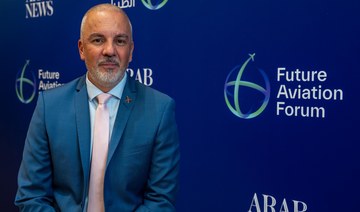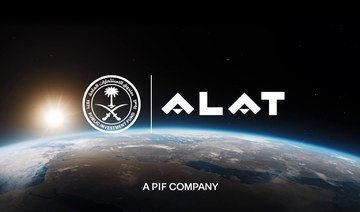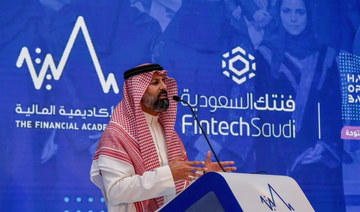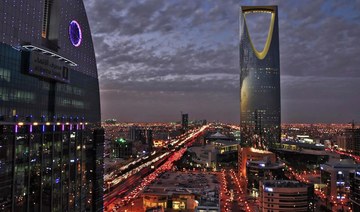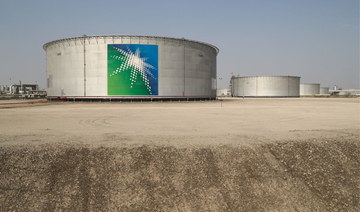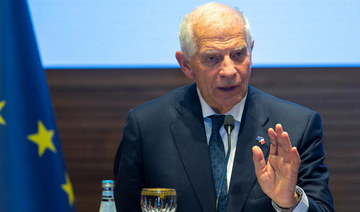BENGALURU: Hikma Pharmaceuticals reported full-year profit and revenue largely in line with expectations, aided by strong performance in the second half of the year.
The company has struggled due to persistent price pressures in the US market and was forced to cut revenue guidance for its generics business thrice in 2017.
Hikma’s problems were further compounded by a delay in the launch of its generic version of GlaxoSmithKline’s blockbuster lung drug Advair. The US Food and Drug Administration on Monday asked Hikma to conduct a further clinical study evaluating the drug.
Hikma posted 2017 generics revenue of $615 million, surpassing its expectation of about $600 million.
The company, which named former Teva Pharmaceutical generics head Sigurdur Olafsson as its CEO in a bid to improve the business, forecast revenue from generics in 2018 to be in the range of $550 million to $600 million.
“We see these results as reassuring in the context of poor market sentiment and multiple headwinds to the business and would expect a positive reaction,” Morgan Stanley analysts wrote in a note.
Hikma shares rose as much as 10.7 percent in early trading.
The Jordan-based drugmaker said earnings before interest, tax, depreciation and amortization fell 5 percent to $468 million for the year ended December 31, but was largely in line with analysts’ estimate of $469.9 million, according to Thomson Reuters.
Revenue fell marginally to $1.94 billion, also keeping with estimates.
Jordanian drugmaker Hikma’s full-year profit, revenues hit expectations
Jordanian drugmaker Hikma’s full-year profit, revenues hit expectations
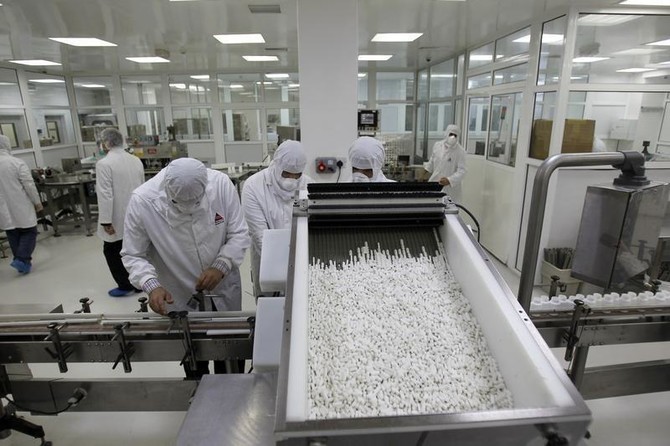
From tennis to paper, PIF pushes ahead with its diverse investments strategy in 2024
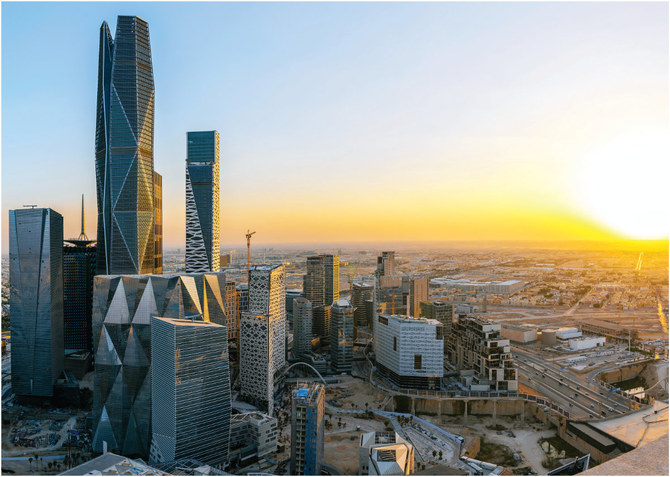
- Sovereign wealth fund continues to drive forward Kingdom’s economic diversification agenda
RIYADH: Tennis, tech and paper production are just some of the areas Saudi Arabia’s Public Investment Fund has reached into so far in 2024, as the body continues to drive forward the Kingdom’s economic diversification agenda.
The sovereign wealth fund has continued with the momentum built up in 2023, which saw it make investments in companies as diverse as London’s Heathrow Airport and Rocco Forte Hotels.
Its activities since the turn of the year saw PIF revise its asset size on its website, reaching $925.2 billion after it climbed to the fifth spot in a ranking of state-owned investment organizations by the Sovereign Wealth Fund Institute.
This monumental rise in the fund’s standing followed its procurement of an additional 8 percent stake in Aramco, boosting its shareholding’s estimated value to $328 billion.
Here are some of the key announcements made by the wealth fund so far in 2024
PIF’s deal withBahrain Mumtalakat to enhance investments
One of the primary deals signed by PIF in the first quarter was a memorandum of understanding inked with Bahrain’s sovereign wealth fund Mumtalakat in March.
The agreement aims to expand cooperation between the two parties, enable new and promising investment prospects in Bahrain, and create opportunities for private companies in both countries.
Yazeed Al-Humied, deputy governor and head of MENA Investments at PIF, said the deal supports the wealth fund’s objectives of building long-term strategic regional partnerships that bring additional value to local economies.
“It also enables the achievement of sustainable returns that further contribute to maximizing PIF’s assets and diversifying the economy in line with the objectives of Saudi Vision 2030,”
said Al-Humeid.
PIF acquired 40 percent stake in Zamil Offshore
In February, the wealth fund acquired a 40 percent stake in Zamil Offshore Co., a significant move that could boost marine support services in Saudi Arabia.
In a press statement, PIF revealed that this investment is part of the fund’s broader strategy to contribute to the development of the Kingdom’s energy base.
Zamil Offshore Co. is one of the largest Saudi-based offshore support providers, operating over 90 vessels in the Arabian Gulf.
Bakr Al-Muhanna, head of the Transport and Logistics Sector in Middle East and North Africa Investments at PIF, said that this investment will strengthen the offshore support industry, contributing to the fund’s wider efforts to develop Saudi Arabia’s energy ecosystem.
PIF’s efforts to accelerate growth of global tennis sports
In February, the wealth fund signed a multi-year strategic agreement with the Association of Tennis Professionals aimed at accelerating the growth of the sport globally.
“Through our collaboration with ATP, PIF will be a catalyst for the growth of the global tennis landscape, developing talent, fostering inclusivity and driving sustainable innovation. This strategic partnership aligns with our broader vision to enhance quality of life and drive transformation in sport both within Saudi and across the world,” said Mohamed Al-Sayyad, head of corporate brand at PIF.
Under the deal, PIF will leverage ATP’s expertise to develop further opportunities for young Saudis in wtennis, including the development of state-of-the-art facilities and ensuring the availability of necessary coaching in the Kingdom.
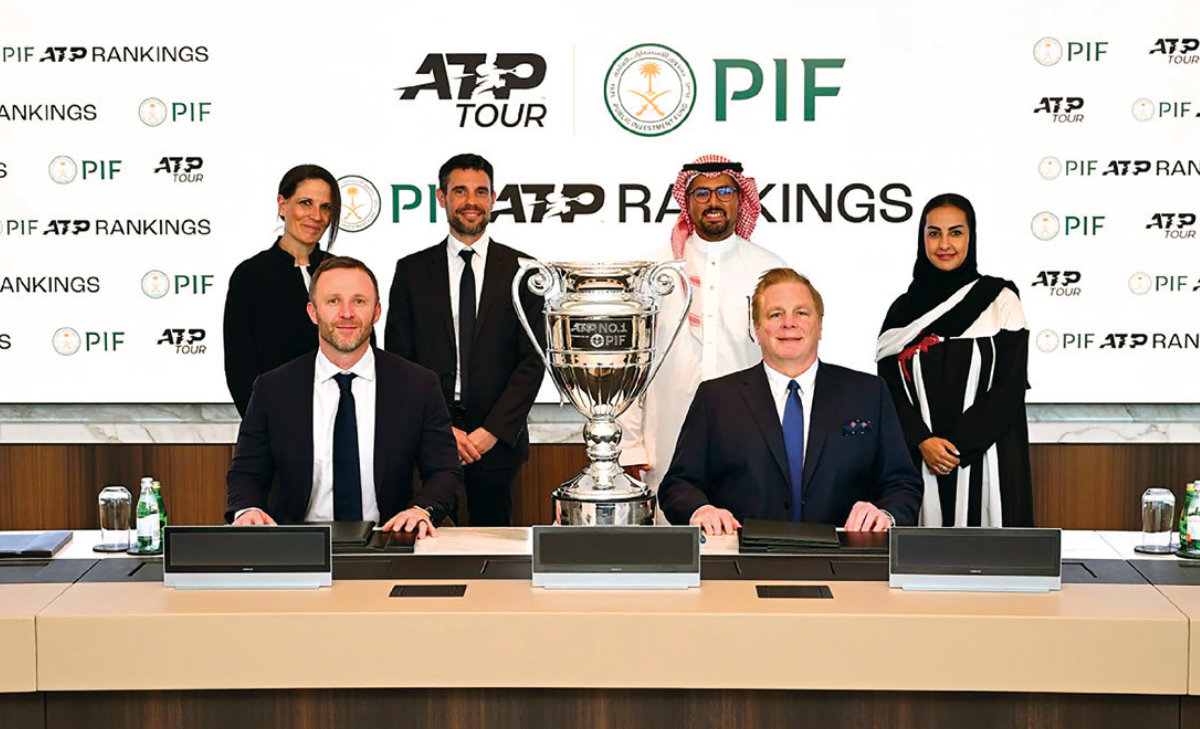
The launch of Alat
Another significant development in February was the launch of Alat, a PIF firm aimed at turning Saudi Arabia into a global hub for sustainable technology manufacturing.
The company will prioritize constructing products tailored for local and international markets across seven strategic business units. These include advanced industries and semiconductors, smart appliances and health solutions, as well as smart devices and building technologies.
Alat will also manufacture more than 30 product categories that will serve vital sectors, including robotic and communication systems, advanced computers and digital entertainment, as well as advanced heavy machinery used in construction, building and mining.
Acquisition of Mepco in diversification push
In January, PIF bought a 23.08 percent stake in the Middle East Paper Co. as the fund continued expanding its investments in the Saudi economy’s primary sectors.
According to a statement, the body acquired the stakes by increasing capital and subscribing to new shares in Mepco. Muhammad Aldawood, PIF’s head of the industrials and mining sector in the Middle East and North Africa region, said the fund’s investment in Mepco reflects the attractive growth opportunities in promising sectors such as recycling, retail, and building materials.
The fund added that PIF’s investment in Mepco will support the private sector in Saudi Arabia, boost local content, increase exports as well as improve quality and competitiveness.
Sami Al-Safran, CEO of MEPCO, said that PIF’s investment will help the company become a national champion in the recycling industry.
“PIF’s investment further enables the implementation of our expansion strategy and captures significant growth potential, both locally and regionally,” said Al-Safran.

Completion of the acquisition of Dubai-based Kent
In February, Saudi contractor Nesma & Partners, backed by PIF, completed the acquisition of Kent, based in Dubai, after signing an agreement in 2023.
In a statement, Nesma said that the acquisition aligns with the company’s strategic growth strategy and aims to position the firm as a global leader in the construction industry.
“The acquisition of Kent represents a significant milestone for Nesma & Partners, reinforcing our commitment to expanding our capabilities and enhancing our position in the global market,” said Samer Abdul Samad, president and CEO of Nesma & Partners.
According to the acquisition details, Kent and Nesma do not plan to integrate operations, and both firms will continue their existing projects.
PIF aims to strengthen electric motorsports sector
In January, the wealth fund signed a multi-year agreement named Electric 360 with Formula E, Extreme E and E1 to support the growth of electric motorsports and their role in advancing the future of electric mobility.
In a press statement, PIF said the partnership will drive technological innovation and revolutionize sustainable transport and future mobility, ultimately reducing carbon emissions.
“Together with these championship series, Electric 360 will redefine electric sport and supercharge its growth, delivering tangible impact aligned with our broader business strategy as PIF drives new green technological innovation that will be the cornerstone of future electric mobility,” said Mohamed Al-Sayyad, head of corporate brand at PIF.
Saudi Arabia’s open banking strategy a game-changer
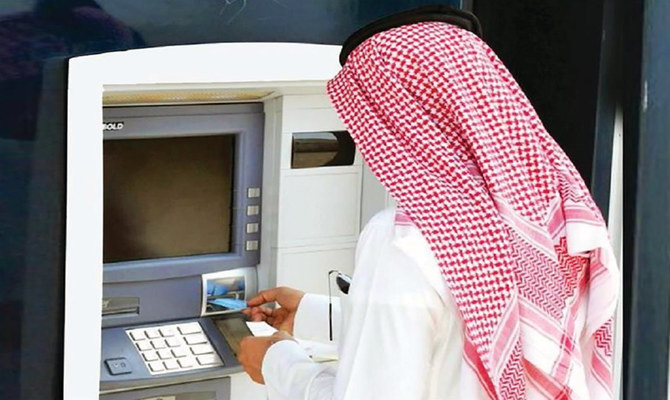
- Initiative enables customers to securely share their data with third parties
CAIRO: Saudi Arabia’s embracing of open banking has transformed the region’s financial ecosystem, according to a top fintech CEO.
In an interview with Arab News, Abdulla Al-Moayed, head of Tarabut, praised the Kingdom’s central bank for its inclusive regulatory impact on the financial sector.
In May 2022, the institution, also known as SAMA, went live with its open banking initiative, which has altered the future of financial technology in the Kingdom and the wider region.
Open banking is a technological innovation that enables customers to securely share their data with third parties.
“Open banking changes the very nature of relationships across the financial ecosystem for Saudi Arabia and for the region as a whole. This is only a good thing,” said Al-Moayed.
Echoing those sentiments, CEO of US-based fintech MoneyHash Nader Abdelrazik, told Arab News: “Open banking (in Saudi Arabia) will significantly catalyze the relationship between banks and fintech, and it will open up a multitude of business use-cases.”
He added: “Banking and finance innovation is highly dependent on access and adoption of open data frameworks. Once these frameworks are in place, not only the existing banks and fintechs will collaborate more, but it will also attract more banks and fintechs to expand to the market and embed their solutions.”
Abdelrazik believes this will increase the economy’s digital sophistication and competitiveness, “but the real winner here is the consumer.”
In its Open Banking Policy report, SAMA said its initiatives focus on “nurturing the rise of digital technologies and their impact on the new financial services enabled by them, as well as building the regulatory framework needed to adopt these initiatives.”
The release further stated: “This opens the door to create and offer new financial services. Therefore, SAMA sees open banking as a pivotal role in the further development of the Kingdom’s financial sector.”
Al-Moayed explained that SAMA’s efforts to standardize application programming interfaces or APIs, are enhancing the country’s monetary platforms, which aim to broaden financial inclusion by facilitating secure, seamless, and affordable access to services and advice.
APIs allow different software applications to communicate with each other, facilitating the integration and sharing of data and functions.
“Standardized APIs enable interoperability between providers, leading to a more cohesive financial ecosystem,” Al-Moayed said.

Open banking changes the very nature of relationships across the financial ecosystem for Saudi Arabia and for the region as a whole.
Abdulla Al-Moayed, Head of Tarabut
“This allows for the development of innovative financial services and products that can cater to a wider range of customer needs. By opening access to financial data, these APIs are fostering an environment of innovation, allowing fintech startups to focus on end-user problems; away from the worries of connectivity and access to data,” he added.
Being one of the region’s leading providers of APIs, Tarabut has set a prime example for others to follow.
“Our mission is to enable the connections necessary to expand financial inclusion for everyone, by building the infrastructure that enables secure, seamless, and inexpensive financial services and advice. As with all financial and personal data, we should be clear that trust, security, and safety are a non-negotiable part of the process,” Al-Moayed stated.
Regarding security, the CEO highlighted: “At Tarabut, we take a series of continuous steps to ensure security, such as ensuring that all transactions and data access requests are authenticated using multiple factors to enhance security, as well as the requirements to also employ state-of-the-art encryption standards to protect data during transmission and storage.”
He further explained: “Data access controls, such as implementing strict controls on who can access specific data and for what purpose, ensure that customer data is not misused.”
Al-Moayed adde: “There are also continuous and regular compliance checks and audits to ensure that all participants in the open banking ecosystem adhere to the highest security standards and regulatory requirements.”
He also underscored the collaborative effort with SAMA during the regulatory sandbox period, which showcased the potential of open banking to transform financial accessibility.
Fostering symbiotic relationships
“Looking at Saudi Arabia, we see a nationwide ambition to promote a symbiotic relationship between banks and fintechs, by enabling data sharing and the adoption of innovative technology solutions,” Al-Moayed said.
“Banks provide fintech companies with access to valuable financial data with customer consent, and the fintechs and the banks can work together to create more personalized and innovative financial products,” he added.
Al-Moayed explained that banks looking to partner with a fintech company could lead to new revenue streams and open up customer segments, enhancing their market reach and product offerings — as well as ensuring adaptability and innovation for the young, digitally-native population
of the Kingdom.
“Together, banks and fintech can reach underserved segments of the population, as well as those who could benefit from improved awareness and access to different services, providing each with the many benefits and impacts that are inaccessible by traditional means,” he said.
Safeguarding consumer data
According to Al-Moayed, SAMA has established a robust legal framework essential for safeguarding consumer data, which mandates explicit consent before sharing financial information with third-party providers.
“SAMA have rightfully identified consumer data protection and privacy as crucial for consumer trust and participation,” stated Al-Moayed.
He elaborated that this approach not only provides consumers control over their personal information but also “gives consumers control over their data, including the right to know how their information is being used and the ability to revoke access at any time, builds trust and encourages participation in the open banking ecosystem,” which is vital for building trust within the banking sector.
“We believe this is a critical part of the trust-building process for banking customers across Saudi Arabia. By making it clear to people that every person is the true owner of their data, they can feel empowered to make the best access decisions for their personal needs,” he added.
A smooth transition
As the Kingdom transitions toward open banking, traditional banks are seizing the opportunity to redefine their roles.
“We have been hugely impressed by the vision and appetite for transformation from banks across the Kingdom,” Al-Moayed expressed.
He explained that financial institutes are transitioning from being mere custodians of customer funds to becoming more integral participants in their customers’ financial lives.
“The banks we partner with truly see open banking as so much more than a new series of regulations to comply with,” he said.
“Recognizing the value of innovation brought by fintech startups, like ours, many banks are forming partnerships and collaborations to leverage the best available technology to enhance their offerings,” Al-Moayed added.
MoneyHash’s Abdelrazik stated that traditional banking will continue to thrive and be active, at least in the short term.
“But with the rise of open banking and numerous opportunities in the fintech sphere, banks implementing a robust digital strategy, and leveraging strategic alliances with fintechs, can be much more competitive and agile to this dynamic market,” he added.
Moody’s affirms Kingdom’s A1 credit rating with positive outlook

- The rating affirmation is based on Moody’s assessment of the government’s significant progress
- It is also based on the track record of macroeconomic and fiscal policy effectiveness
RIYADH: Moody’s, the global credit rating agency, has affirmed Saudi Arabia’s credit rating at ‘A1’ with positive outlook, reported the Saudi Press Agency on Saturday.
The rating affirmation is based on Moody’s assessment of the government’s significant progress achieved in implementing broad-based reform agenda since 2016.
It is also based on the track record of macroeconomic and fiscal policy effectiveness that will support the sustainability of the economic diversification.
Furthermore, Moody’s expects the continued implementation of large diversification projects in Saudi Arabia will support nonhydrocarbon real GDP growth as they are designed to be modular and commercialized in phases.
The international credit rating agency further mentioned that the positive outlook is a reflection of the reforms and investments in various nonoil sectors that will, over time, lead to a material decline in the Kingdom’s economic and fiscal reliance on hydrocarbons.
Moreover, the agency touched on the country’s large economy, improving institutions and policy effectiveness, robust balance sheet and large foreign currency buffers.
Point-of-sale spending in Saudi Arabia hits record $16bn, SAMA reveals

RIYADH: Food and beverages transactions helped drive point-of-sale payments in Saudi Arabia to a record SR59.68 billion ($15.91 billion) in March, official data has revealed.
Figures released by the Saudi Central Bank, also known as SAMA, show an 8 percent annual increase in spending across all sectors, with outlays during the holy month of Ramadan likely responsible for driving the uptick, alongside an expanding market with flexible payment options.
Spending on food and beverages in March made up the largest portion, accounting for 17 percent of total payments for the month.
Expenditures on restaurants and cafes, along with miscellaneous goods and services, each represented 12 percent of overall spending.
In February, Redseer Strategy Consultants predicted a heightened eagerness among consumers in Saudi Arabia to explore new attractions and destinations during Ramadan.
Their survey, probing changes in shopping behavior for Ramadan 2024 compared to the previous year, revealed that 62 percent of Saudi respondents planned to increase their spending, surpassing the 48 percent of respondents from the UAE.
The report highlighted that this surge is driven by factors related to platforms and experiences, particularly flexible payment options and the launch of exclusive products of high quality.
The research showed that in the UAE, where the market has matured, consumers are placing a growing emphasis on affordability, prioritizing products with the lowest prices.
Factors such as product variety, fast delivery, and quality no longer serve as significant brand differentiators, as the market has leveled the playing field.
Conversely, in Saudi Arabia, a market experiencing growth, there is a notable focus on platform and experience-related aspects. Flexible payment options and strong customer support are becoming increasingly important, indicating a shift in consumer preferences.
According to data from SAMA, the primary drivers of growth during this period were increased spending on miscellaneous goods and services, which include personal care supplies and cleaning products.
This category represented the second-highest share of March spending at 12 percent, having grown by 28 percent to reach SR7.06 billion. This growth accounted for 36 percent of the overall annual increase in POS spending.
The second-highest contributor to the rise is clothing and footwear, with an increase that contributed 26 percent to the overall growth, reaching SR5.8 billion in March. This was followed by food and beverages, contributing 13 percent, with spending reaching around SR10 billion, marking a 6 percent increase from the same month last year.
Research from Redseer indicated a strong inclination among Saudi respondents towards purchasing groceries, fashion, and beauty or personal care products during the month of Ramadan.
According to the survey, 93 percent of respondents were open to buying groceries, 84 percent to buying fashion, and 72 percent to buying beauty and personal care products.
This period is often associated with heightened social engagements, hospitality, and generosity, leading to increased consumer spending on food, gifts, and charitable donations. Additionally, businesses often offer special promotions and discounts during Ramadan, further stimulating consumer spending.
In Saudi Arabia, there has been a notable shift towards online payments and digitalization, driven by the country’s commitment to providing cutting-edge technologies for its tech-savvy population.
With the rise of e-commerce accessibility and the increasing convenience of online shopping platforms, consumers are opting for digital transactions more than ever before. This trend is not only reshaping the retail landscape but also significantly impacting consumer behavior.
The ease of comparing prices and product options online has empowered consumers, fostering increased competition among retailers and ultimately driving down expenses.
As a result, the adoption of digital payment methods continues to grow rapidly, reflecting a fundamental shift in how transactions are conducted in Saudi Arabia’s dynamic and rapidly evolving marketplace.
One challenge that arises with this growth is the proliferation of fraudulent sites and platforms attempting to deceive interested users. During Ramadan and Eid Fitr, the increase in retail and online transactions provides more opportunities for cybercriminals.
These fraudulent entities have targeted major Saudi platforms by creating fake websites designed to intercept two-factor authentication or one-time passcode codes.
According to Cyber Security News, this sophisticated phishing tactic aims to bypass security measures and gain unauthorized access to victims’ accounts.
Consumers are therefore strongly advised to avoid sharing personal and payment information on questionable sites or with individuals posing as bank or government employees.
Reporting suspicious resources to local law enforcement and designated contacts within these organizations is crucial in helping to mitigate potential fraud risks.
Nearly all Gazans in poverty, Palestinian Authority facing ‘imminent fiscal collapse’ - World Bank
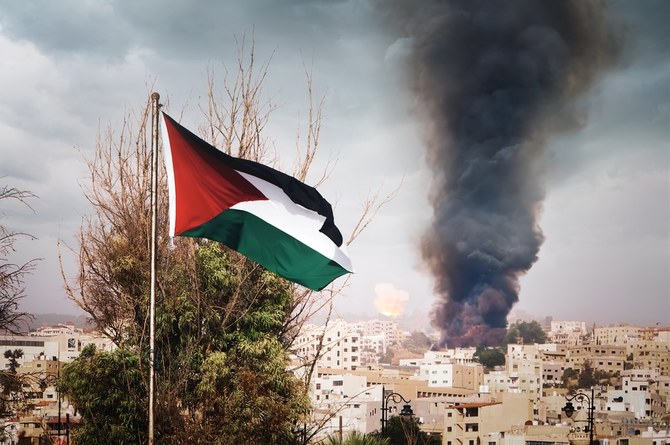
RIYADH: Nearly every Gazan is living in poverty as the Israel-Hamas war continues to have a “devastating impact” on the Palestinian economy, according to the World Bank.
An analysis by the organization sets out how the economic consequences of the conflict have spread beyond Gaza and into the West Bank, with widespread unemployment and underemployment combined with inflation causing a rapid decline in purchasing power for households in both areas.
Nearly half a million jobs across the territories have been lost since October 2023, and per capita gross domestic product declined by 12 percent in 2023.
Israel has bombarded the densely populated Gaza Strip following the Oct. 7 Hamas attack on Israeli communities. Israel says Hamas killed some 1,400 people including children, and took more than 200 hostages, some of them infants and older adults.
The fiscal situation of the Palestinian Authority has dramatically worsened, according to the World Bank, with a financing gap expected to reach $1.2 billion heightening the risk of disorderly adjustments and a potential imminent fiscal collapse.
In May 2023, the World Bank forecast the Palestinian economy to grow about 3 percent by the end of the year, after a 4 percent post-COVID-19 boost in 2022.
That analysis has been completely reversed by the conflict, with the organization now forecasting the Palestinian economy will contract anywhere between 6.5 percent and 9.4 percent during 2024.
“The northern governorates of Gaza are experiencing a full-blown famine, with food insecurity reaching catastrophic levels, particularly in the northern areas and extending southward,” said the World Bank’s latest report, adding: “At least one in four Gazan is experiencing catastrophic hunger, and 95 percent of the population is suffering from food insecurity.”
Most children in Gaza are at risk of “stunting” because of the famine, the analysis added.
Reflecting on the economic impact of the conflict, the report said the outlook of the Palestinian territories for the full year of 2024 “remains highly uncertain, depending on the severity and duration of the conflict, changes in Israeli policies in the West Bank, including those related to access to the Israeli labor market, and the outcome of the clearance revenue dispute.”
The Palestinian Authority is facing a significant decrease in clearance revenue transfers and shrinking domestic resource mobilization, coupled with a rigid current expenditure envelope, the World Bank said.
“The PA’s financing gap after aid for 2023 reached $682 million or 3.9 percent of GDP, and the situation is expected to worsen further in 2024, with a potential financing gap of up to $1.2 billion. A focus on fiscal policies, especially those improving spending efficiency, particularly regarding the unsustainable wage bill and enhancing tax mobilization, must remain a top priority in the reform agenda,” said the report.
The World Bank argued that the banking sector across the territories is “well regulated” by the Palestine Monetary Authority, which has “steadily been building the capabilities and resilience of local banks.”
The report added: “Presently, the banking system is well capitalized, liquid, and compliant with the Capital Adequacy Requirements set by the PMA. At the same time, institutional and economic difficulties are tilting the risks upward for the financial sector. Actively avoiding further instability is crucial to allow the financial sector to maintain its established function as a stable pillar during periods of economic challenges.”




